ClickFunnels and Shopify are often compared, but they are not competing tools in the traditional sense. They solve different problems and are designed for different ways of selling online.
ClickFunnels is built around one objective: guiding visitors through a focused sales journey. It’s used by marketers, coaches, and digital product sellers who rely on funnels, upsells, webinars, and follow-up automation to convert attention into revenue. The platform prioritizes conversion flow over storefront design.
Shopify, by contrast, is a full ecommerce platform. It’s designed for businesses that sell products at scale and need inventory management, product catalogs, shipping tools, and a structured checkout experience. Its strength lies in operational stability and long-term store growth, not funnel optimization.
Choosing between ClickFunnels and Shopify isn’t about which platform is better. It’s about which one aligns with how your business actually sells.
This guide breaks down ClickFunnels vs Shopify across core functionality, ecommerce capabilities, marketing tools, pricing, and real-world use cases so you can choose the platform that fits your business model, not the one that happens to be popular.
Key Takeaways
- ClickFunnels and Shopify are not interchangeable platforms; they are built for fundamentally different selling models.
- ClickFunnels is designed for conversion-driven funnels, making it best suited for digital products, services, webinars, and high-ticket offers.
- Shopify is built for ecommerce operations, excelling at product catalogs, inventory management, fulfillment, and long-term store scalability.
- ClickFunnels prioritizes guiding users through a single, controlled sales journey, while Shopify prioritizes browsing, cart-based purchasing, and repeat transactions.
- The right choice depends on how you generate revenue: funnels and direct-response marketing vs. storefront-based ecommerce.
- Many businesses successfully use both platforms together, leveraging ClickFunnels for front-end conversion and Shopify for backend ecommerce infrastructure.
- Choosing the wrong platform can slow growth not because the tool is weak, but because it doesn’t match your business model.
Disclaimer: I am an independent Affiliate. The opinions expressed here are my own and are not official statements. If you follow a link and make a purchase, I may earn a commission.
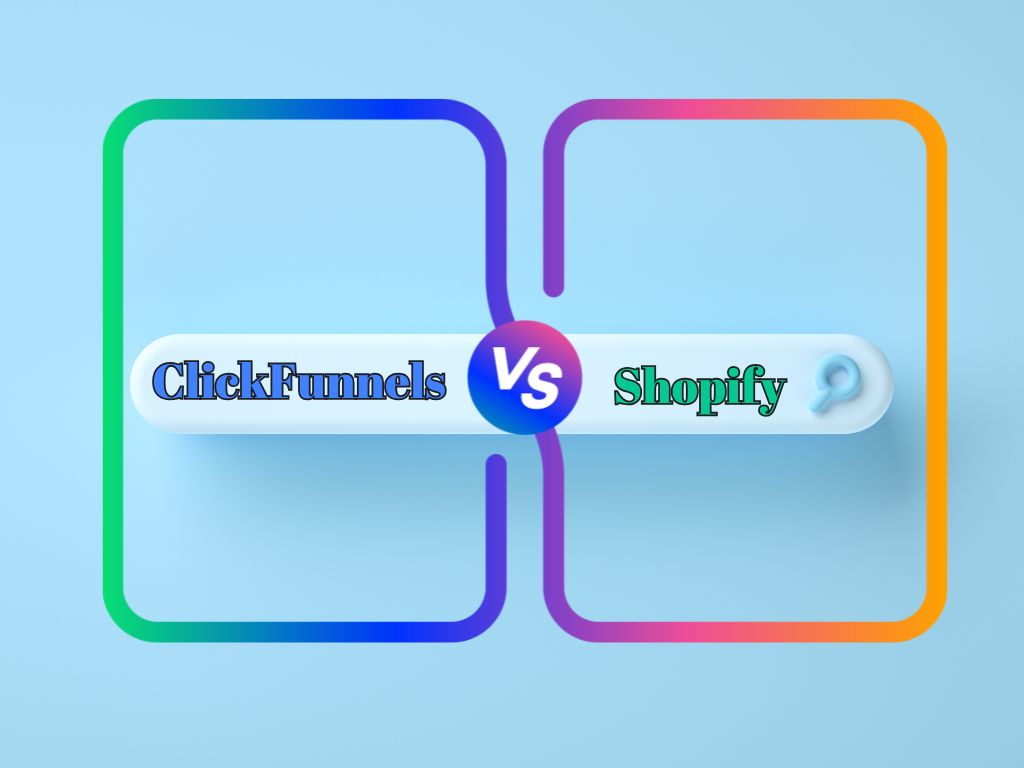
What Each Platform Is Really Built For
ClickFunnels and Shopify both help businesses sell online but they’re built for very different types of selling.
ClickFunnels was created to serve entrepreneurs, coaches, small businesses etc who sell online . The purpose is on guiding potential customers through a specific sales journey whether that’s downloading a lead magnet, signing up for a webinar, or purchasing a digital product. The goal is simple: increase conversions at every step.
Shopify was designed to help retailers manage and scale an ecommerce business. Whether you sell ten or ten thousand physical products, Shopify handles product listings, shopping carts, shipping, taxes, inventory, and payment gateways all within a structured online store.
The core difference:
- ClickFunnels is built for high-converting sales funnels ideal for digital products, services, and focused offers.
- Shopify is built for full-scale ecommerce operations ideal for physical products, large catalogs, and multichannel sales.
If you need a platform that walks your audience step-by-step toward a single action, ClickFunnels is likely the better fit. If you’re managing inventory, processing orders, and need a storefront that scales, Shopify is built for that job.
Feature Comparison: ClickFunnels vs Shopify
| Feature | ClickFunnels | Shopify |
|---|---|---|
| Primary Use | Sales funnels, lead gen, high-ticket offers | Ecommerce storefront for products |
| Ideal For | Marketers, coaches, course creators | Retailers, dropshippers, brands |
| Sales Approach | One focused offer at a time | Browsing and cart-based sales |
| Best Fit When… | You want to guide users step-by-step | You want a full-featured online store |
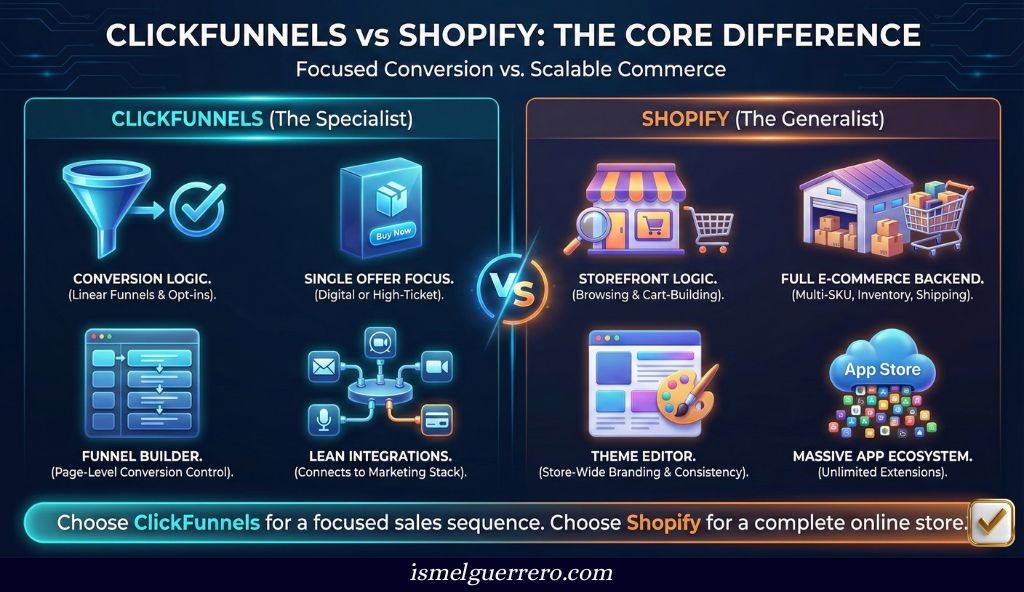
Clickfunnels vs Shopify: Feature & Functionality Comparison
When it comes to tools, both platforms offer a range of features but what they prioritize is very different. Here’s how they compare across the functions that matter most.
Sales and Marketing Tools
ClickFunnels is built around marketing from the ground up. You’ll get the tools to create opt-in funnels, sales pages, webinar registrations, upsell/downsell flows, order bumps, and more all within a visual funnel builder. Its native focus is on conversion logic, not product display.
Shopify, on the other hand, centers around ecommerce. Its marketing features come through apps and integrations email campaigns via tools like Klaviyo or Mailchimp, upsell and promo apps, SEO settings, and discount systems. It’s strong on promotions, but its structure is based on storefront logic, not linear funnels.
What sets them apart:
- ClickFunnels is optimized for one conversion at a time
- Shopify is optimized for browsing, cart-building, and transactional sales
If your sales rely on lead generation and nurturing sequences, ClickFunnels delivers those tools out of the box. If your business depends on having a clean product catalog and a traditional online shopping experience, Shopify is a better fit.
E-commerce Capabilities
This is where the separation between a funnel platform and an ecommerce engine becomes clear.
Shopify was built from day one as a full-service ecommerce platform. You can add products with variants (sizes, colors, etc.), manage inventory, handle taxes, process payments, and fulfill orders all from a centralized dashboard. It supports physical and digital products, subscriptions, gift cards, and even POS for in-person sales. Shipping rates, abandoned cart recovery, and multichannel selling (Instagram, Amazon, Facebook) are baked into the platform or available through the Shopify App Store.
ClickFunnels, by contrast, supports basic product selling within a funnel especially for digital products, one-time offers, or high-ticket services. You can create order forms, upsells, downsells, and thank-you pages, but there’s no real backend for inventory, multi-product navigation, or fulfillment workflows. It’s built to sell one product or offer per funnel, not manage a full catalog.
What it comes down to:
- Shopify gives you a complete ecommerce backend ideal for running a full online store.
- ClickFunnels gives you a focused sales experience ideal for selling a single product or service through a guided process.
If your business depends on managing multiple SKUs, shipping logistics, or ongoing order processing, Shopify is purpose-built for that. If your offer is centered around one high-converting page (or sequence of pages), ClickFunnels removes the clutter and drives the action.

Customization & Design
Both ClickFunnels and Shopify offer drag-and-drop builders, but the flexibility and design logic behind each platform are very different.
ClickFunnels uses a visual editor focused on funnel layout. You can build each step of the funnel opt-in, sales page, order form, upsell, and thank-you page individually. It offers control over page elements, spacing, headlines, CTAs, and mobile responsiveness. While the editor is straightforward, it’s primarily built around conversions, not aesthetics.
Shopify, on the other hand, operates more like a traditional website builder. You choose a theme (free or paid), then customize using sections, menus, and theme settings. While it’s less flexible than ClickFunnels in terms of funnel logic, Shopify gives you greater control over store layout, product displays, blog formatting, and visual branding.
In summary:
- ClickFunnels offers more freedom for building high-converting pages, but within a funnel-first framework.
- Shopify offers better overall control for building a full storefront, especially if design consistency and multi-page structure matter.
If your priority is crafting a single sales page that converts cold traffic, ClickFunnels gives you that precision. If your goal is to present a polished, branded shopping experience across dozens (or hundreds) of products, Shopify gives you the structure to scale it.
Integrations and Extensions
When it comes to expanding what your platform can do, both ClickFunnels and Shopify offer integration options but the depth and focus are different.
Shopify has one of the largest app ecosystems in ecommerce. The Shopify App Store features thousands of extensions from payment gateways and shipping calculators to marketing apps, CRM tools, customer loyalty programs, reviews, and upsell widgets. Many of these are plug-and-play, and the ecosystem is tightly controlled for quality and compatibility.
ClickFunnels, by contrast, offers direct integrations with major tools email services like ActiveCampaign and Mailchimp, webinar platforms, Stripe, PayPal, and Zapier for extended connectivity. It doesn’t offer nearly as many native apps or plugins, because the platform is designed to be lean and focused. Its strength lies in integrating with your existing marketing stack, not replacing it.
Key Feature Comparison: ClickFunnels vs Shopify
| Key Feature | ClickFunnels | Shopify |
|---|---|---|
| Built-in Funnel Builder | ✅ Core feature | ❌ Requires third-party apps |
| Product Catalog Support | ❌ Limited (1–3 products max) | ✅ Full catalog with variants |
| Email Marketing | ✅ Included on higher plans | ❌ External tools required |
| Inventory Management | ❌ Not built-in | ✅ Complete inventory dashboard |
| Multichannel Sales | ❌ Not natively supported | ✅ Instagram, Amazon, POS & more |
Here’s the difference:
- Shopify gives you access to a massive library of extensions to run and grow a full ecommerce operation.
- ClickFunnels offers fewer integrations, but strong support for core marketing tools that enhance funnel performance.
If you need operational add-ons to manage a store shipping, tax automation, loyalty programs Shopify is built for that. If you already have your marketing stack and just need to plug in lead capture, email automation, and payment flow ClickFunnels gets out of the way and lets your tools do their job.
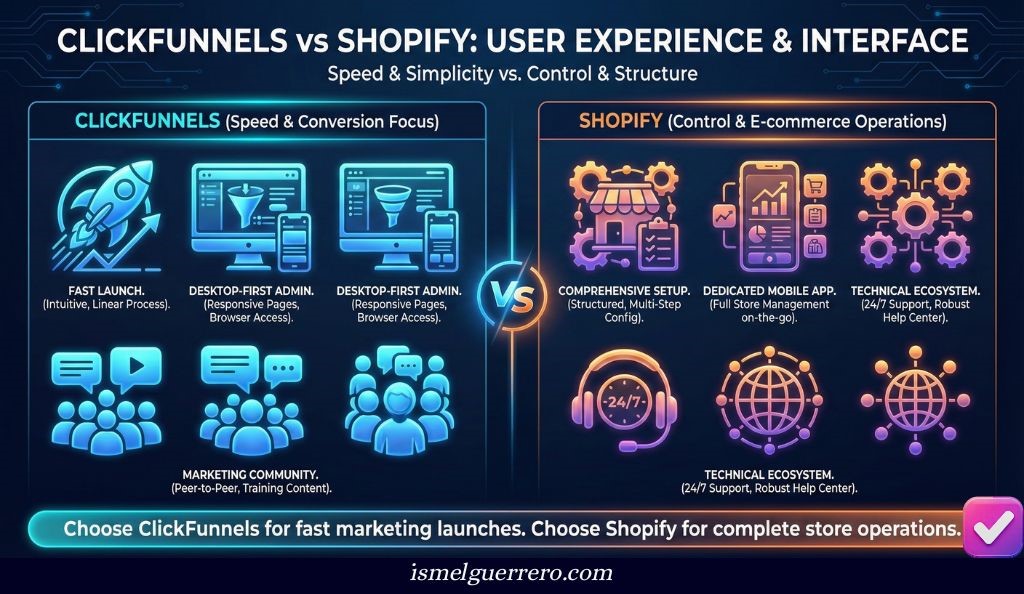
Clickfunnels vs Shopify: User Experience and Interface
Ease of Use
ClickFunnels is built for speed. Its onboarding is straightforward, the editor is intuitive, and the funnel-building process follows a clear step-by-step structure. You don’t need technical skills to get started, and even first-time users can launch a funnel quickly using pre-designed templates.
Shopify is also beginner-friendly but has more moving parts. Setting up a full online store involves product setup, payment gateways, shipping options, taxes, and theme customization. The interface is clean and well-organized, but there’s a steeper initial setup compared to ClickFunnels especially if you’re not familiar with ecommerce logistics.
Bottom line:
- ClickFunnels is faster to learn if you’re focused on building single-offer funnels or lead-gen pages.
- Shopify takes longer to configure but offers deeper control over store structure and product operations.
Mobile & Admin Functionality
Both platforms offer mobile-optimized designs and backend access on the go.
ClickFunnels pages are responsive by default, and you can edit mobile versions directly inside the builder. While there’s no full mobile app for admin use, funnels can be managed from a browser.
Shopify offers a dedicated mobile app that allows you to manage orders, inventory, customer communication, and analytics. It’s ideal for store owners who need real-time control while away from their desk.
If mobile management matters for day-to-day operations, Shopify is better equipped. For creators and marketers who primarily build funnels on desktop, ClickFunnels is more than sufficient.
Community & Support
ClickFunnels has a large, active user community with dedicated Facebook groups, regular live events, and extensive training content through FunnelFlix. Support is available via email and chat, but community support is often faster for real-world answers.
Shopify offers 24/7 live chat and email support, as well as a robust help center and a massive third-party ecosystem of developers, forums, and tutorials. Its support is built for ecommerce at scale, not just marketing.
If you want a high-energy, marketing-focused community,
ClickFunnels delivers. If you need a broader base of technical support and ecommerce best practices, Shopify gives you access to a deeper ecosystem.
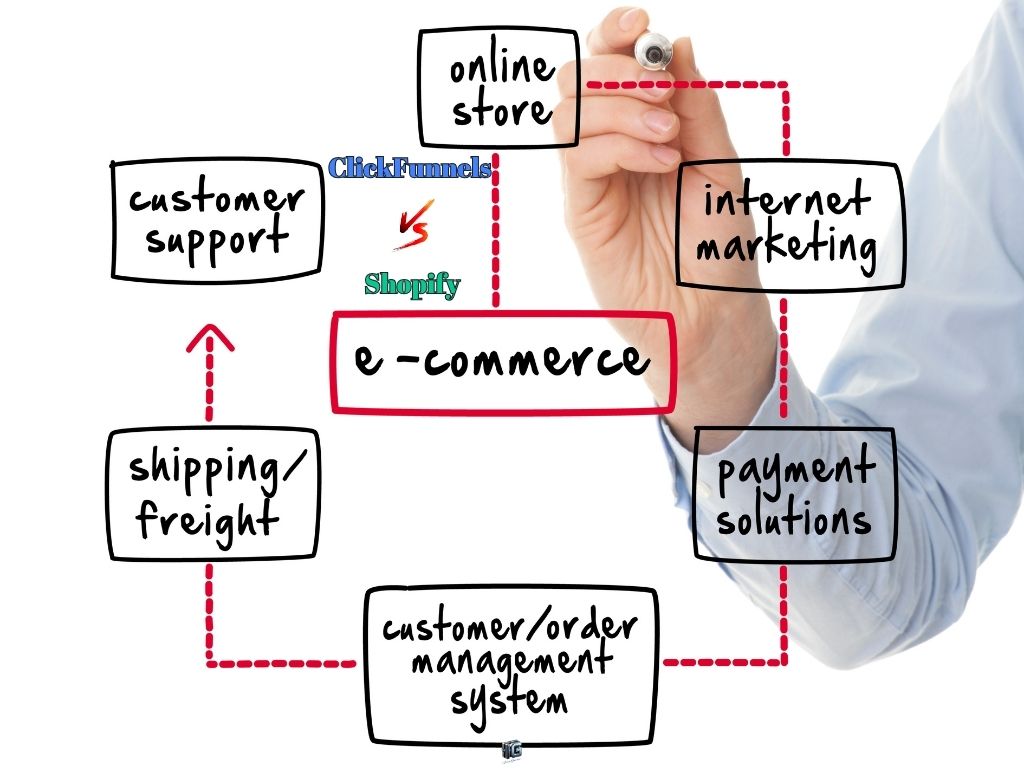
Clickfunnels vs Shopify: Pricing, Fees, and Value for Money
Pricing Breakdown
ClickFunnels follows a tiered pricing model focused on funnel volume and features:
- Basic Plan: Includes funnel builder and hosting; limited pages, funnels, and domains.
- Pro/Funnel Hacker Plan: Adds Follow-Up Funnels (email automation), affiliate tools, analytics, and more generous usage limits.
There are no transaction fees, but you’ll likely need to integrate with third-party tools (email, CRM, etc.), which can increase your total monthly cost.
Shopify offers multiple plans designed around ecommerce store size and features:
- Basic Shopify: Core store functionality for smaller catalogs.
- Shopify / Advanced Shopify: Scales with reporting, shipping discounts, and lower transaction fees.
- Shopify Plus: Enterprise-level solution with custom pricing.
Shopify charges a monthly fee, they also apply transaction fees unless you use Shopify Payments. App subscriptions can also add up as you extend functionality.
Cost comparison reality:
- ClickFunnels has a higher base price but includes the core funnel features without upselling apps.
- Shopify starts lower but adds costs through apps, add-ons, and transaction fees especially as you scale.
Pricing Comparison: ClickFunnels vs Shopify
| Pricing Factor | ClickFunnels | Shopify |
|---|---|---|
| Starting Monthly Price | $97 – $297 | $39 – $399+ |
| Email Automation | Included (Pro+ plans) | Via apps like Klaviyo |
| Transaction Fees | None (from ClickFunnels) | 2% unless using Shopify Payments |
| App/Add-on Costs | Low – Most tools built-in | Medium to high with scaling |
| Overall Cost Control | Predictable monthly cost | Flexible, but adds up |
Clickfunnels vs Shopify: Return on Investment Considerations
ClickFunnels delivers ROI when your business revolves around lead generation, high-ticket offers, or sales-focused funnels. The return is measured in conversion rate improvement and speed to market not in features per dollar.
Shopify delivers ROI when your business depends on managing products, logistics, and store operations at scale.
The value is in infrastructure, integrations, and scalability, especially for businesses with growing inventory and multichannel needs.
If your business sells one or a few offers repeatedly,
ClickFunnels justifies its cost by simplifying the path to revenue. If your business manages a catalog of physical or digital products, Shopify is built for long-term store performance and growth.

Which Platform Fits Your Business Model?
ClickFunnels Works Best When Your Business Is Built For More Than A Physical Product
ClickFunnels is the better choice if your business revolves around guiding someone through a specific sequence opt-in, sales page, upsell, and checkout.
It’s ideal when you’re focused on:
- Selling a single offer or a small set of products
- Running launch-style campaigns or evergreen funnels
- Capturing leads and converting them through follow-up automation
- Selling services, digital products, webinars, or coaching programs
ClickFunnels is built for focused sales systems not browsing, product discovery, or large catalogs. If your model is about maximizing value from a single customer journey, it’s a natural fit.
Shopify Wins When You’re Running a Store
Shopify is built for businesses that sell products at scale whether physical or digital and need infrastructure to manage operations.
It’s the right platform if you’re:
- Selling multiple products or variants (colors, sizes, styles)
- Managing inventory, shipping, taxes, and fulfillment
- Running a long-term brand or ecommerce store
- Wanting to sell across channels like Instagram, Amazon, and POS
Shopify isn’t designed to optimize funnels, it’s designed to run a business. If your goal is to build a stable, scalable store with backend control, Shopify is the smarter long-term play.
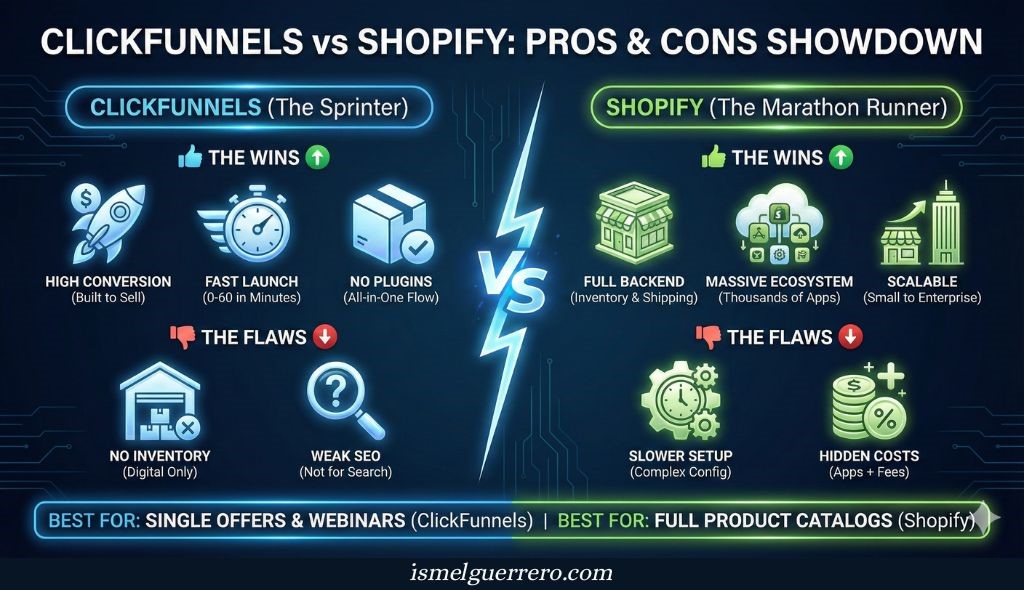
ClickFunnels vs Shopify: Pros and Cons
ClickFunnels Pros and Cons
Pros
- Built specifically for funnels that convert
- Fast to launch pages, upsells, webinars, and lead captures
- No need for extra plugins to create sales flows
- Ideal for digital products, services, and single-offer campaigns
- Strong marketing automation and follow-up logic (on higher tiers)
Cons
- Limited e-commerce backend, no inventory management or product catalog
- Higher starting price compared to basic Shopify plans
- Not built for running full storefronts or multichannel retail
- Email automation requires upgraded plans or integrations
Shopify Pros and Cons
Pros
- Full e-commerce engine with inventory, payments, shipping, and taxes
- Scales well from small stores to enterprise ecommerce
- Massive app ecosystem to extend functionality
- Excellent for physical products, retail brands, and multichannel selling
- Clean, customizable storefront themes
Cons
- Not designed for funnel-building or one-off sales campaigns
- Conversion-focused features require add-ons or third-party apps
- Limited native lead-gen or webinar tools
- Monthly fees can increase with added apps and transaction costs
Strategic Comparison: ClickFunnels vs Shopify
| Area | ClickFunnels | Shopify |
|---|---|---|
| Core Philosophy | One offer, one action | Browse, choose, and check out |
| Best Use Case | Digital offers, webinars, coaching | Product catalogs, physical goods, retail |
| Sales Flow Style | Step-by-step funnel journey | Standard ecommerce cart flow |
| Marketing Strategy | Direct response, urgency, scarcity | Brand-building, SEO, long-term engagement |
| Customer Interaction | Lead capture + nurturing | Browsing, discovery, repeat transactions |
| Speed to Launch | 🚀 Faster (less to build) | ⏱️ Slower (more to configure) |
| Scalability Type | High-margin, low-volume | High-volume, structured fulfillment |

Conclusion: ClickFunnels vs Shopify
ClickFunnels and Shopify are both powerful but they serve completely different purposes.
ClickFunnels is a sales funnel builder. It’s designed to move a lead toward a single action whether that’s buying, signing up for a webinar, or downloading a lead magnet. It works best for businesses that sell digital products, services, or high-ticket offers through focused marketing campaigns.
Shopify is an ecommerce platform. It’s built for managing products, tracking inventory, processing payments, and growing a scalable online store. If you sell physical goods, need a catalog, or rely on multichannel sales, Shopify provides the structure and backend to support it.
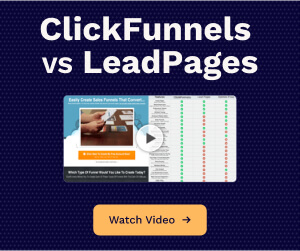
The right choice comes down to how you sell:
- Choose ClickFunnels if you’re building offers, not stores and your revenue depends on conversion-focused funnels.
- Choose Shopify if you’re managing a product-based business and need a reliable, scalable storefront.
They’re not interchangeable. Each excels in its own space. Before choosing, ask: Do you need a store or a sales machine?
That answer will guide you to the right platform.
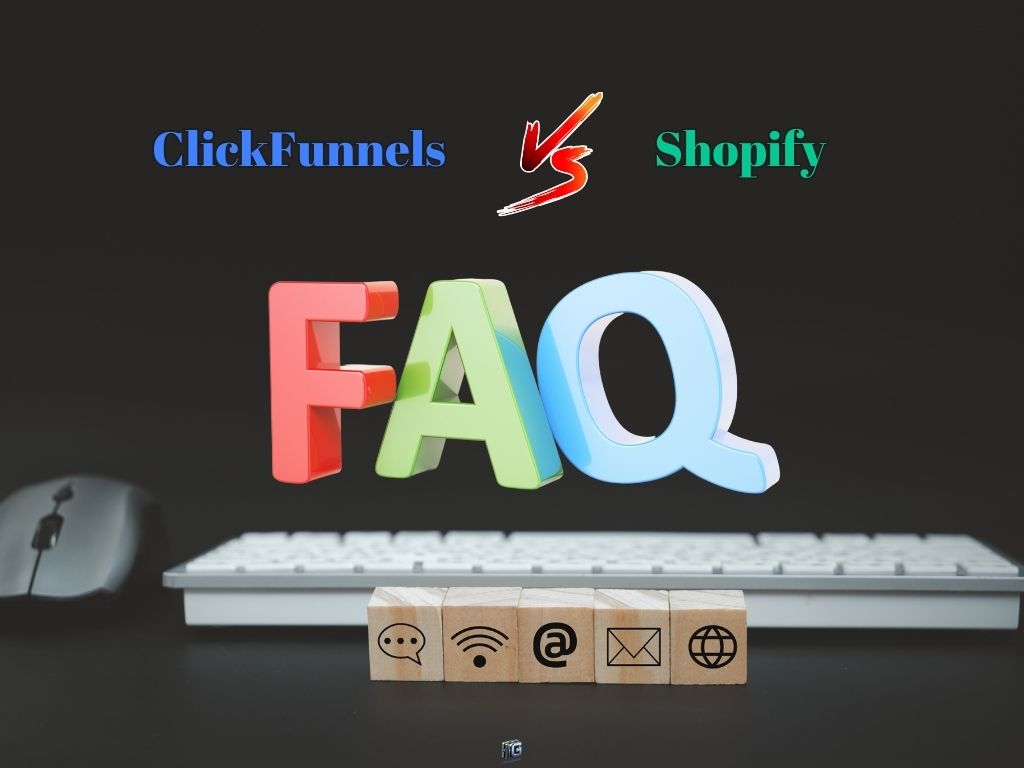
Frequently Asked Questions (FAQs)
Is Shopify better than ClickFunnels for my business?
It depends on how your business is structured. If you manage a product catalog, need inventory tools, or plan to scale an online store across multiple channels, Shopify is likely the better fit. If your business runs on direct-response marketing, digital offers, or lead generation, ClickFunnels is more aligned with your goals.
Can I integrate ClickFunnels with Shopify?
Yes. You can use ClickFunnels to build front-end funnels and pass customers into your Shopify store for checkout or follow-up offers. This hybrid approach works well for businesses that want the funnel performance of ClickFunnels with the ecommerce infrastructure of Shopify.
What are the main cost differences between the two platforms?
ClickFunnels has a higher starting price, especially if you want access to features like email automation and affiliate tools. However, most features are included. Shopify starts at a lower monthly rate but often requires additional apps and charges transaction fees if you don’t use Shopify Payments.
Which platform offers better support and community resources?
Shopify has 24/7 live chat and a massive library of help docs, along with a large developer and partner ecosystem. ClickFunnels has a strong community of marketers, extensive training (FunnelFlix), and responsive support, but fewer official integration partners.
Does Shopify have a built-in funnel builder?
Not natively. Shopify is built around product pages and checkout flows not marketing funnels. To create true funnels, you’ll need third-party apps or integrations.
4 Comments
ClickFunnels vs Leadpages: The Brutally Honest 2025 Showdown - Ismel Guerrero. · March 26, 2025 at 7:35 am
[…] if you’re building an online store instead? This ClickFunnels vs Shopify guide might […]
Stan Store vs Shopify: Creators, Read This First! - Ismel Guerrero. · April 2, 2025 at 11:14 pm
[…] read our ClickFunnels vs Shopify […]
Shopify vs BigCommerce: Brutally Honest Comparison - Ismel Guerrero. · April 9, 2025 at 8:07 pm
[…] you choose, read our ClickFunnels vs Shopify comparison for a smarter […]
Constant Contact vs Mailchimp: The Shocking 2025 Winner - Ismel Guerrero. · April 26, 2025 at 2:07 pm
[…] After mastering email, read our ClickFunnels vs Shopify Comparison. […]